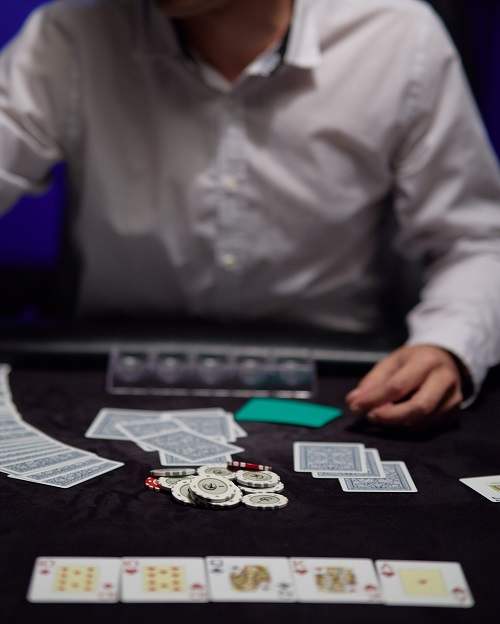What Drives the Psychology of Blackjack Strategy?
Date Posted: 2/29/2024

As you step into the world of blackjack maya33 e-wallet, you find yourself grappling with the enigmatic allure of the game. What drives players to make certain decisions, to strategize, and to outsmart their opponents?
The psychology of blackjack strategy is a fascinating subject that delves into the depths of human behavior and cognition. From beliefs and emotions to cognitive biases and social influence, there are numerous factors at play in shaping our choices at the blackjack table.
In this discussion, we will unravel the intricacies of what truly drives the psychology behind blackjack strategy, peeling back the layers of the human mind to understand the motivations and influences that guide our every move.
Beliefs and Perceptions in Blackjack
Beliefs and perceptions play a crucial role in shaping the strategies employed by blackjack players. While some may dismiss superstitions and luck in blackjack as mere myths, it's undeniable that they hold significant influence over the decisions made at the blackjack table.
Many players rely on lucky charms or rituals to boost their confidence or bring them good fortune. Although these beliefs may seem irrational, they can have a psychological impact on a player's mindset, affecting their decision-making process.
However, it's important to note that successful blackjack strategy is primarily based on mathematical analysis. Counting cards, calculating probabilities, and implementing optimal strategies are all essential components of a winning game plan. By understanding the mathematical principles and probabilities behind the game, players can make informed decisions that minimize risk and increase their chances of success.
Emotional Factors in Blackjack Strategy
Emotional jili slot malaysia factors significantly impact the effectiveness of blackjack strategy, often leading players to make suboptimal decisions based on fear, excitement, or frustration. Emotional intelligence plays a crucial role in blackjack, as it involves the ability to recognize and manage emotions effectively.
Players with high emotional intelligence are more likely to remain calm and composed, making rational decisions based on the cards and the situation at hand. On the other hand, players with low emotional intelligence may succumb to impulsive behavior, making decisions driven by their emotional state rather than logic.
Psychological resilience also plays a vital role in blackjack strategy. Resilient players are better equipped to handle losses and setbacks, maintaining a stable mindset and making decisions based on strategic thinking rather than emotional reactions.
Cognitive Biases and Decision Making in Blackjack
When making decisions in blackjack mooncity56, it's important to be aware of the cognitive biases that can affect your decision-making process. Cognitive biases are systematic patterns of deviation from rationality, which lead to irrational judgments and decisions.
In the context of blackjack, these biases can have a significant impact on your gameplay and overall strategy. One common cognitive bias is the belief that previous outcomes in the game can predict future outcomes. This is known as the gambler's fallacy, where individuals mistakenly believe that if an event hasn't occurred for a while, it's more likely to happen soon.
Another bias is the illusion of control, where players believe they've control over the outcome of the game, even though it's ultimately determined by chance. These biases can distort your decision-making process and lead to suboptimal choices.
Risk Perception and Risk-Taking in Blackjack
Risk perception and risk-taking in blackjack can greatly impact the decisions players make at the table. Psychological factors play a crucial role in blackjack decision making. One such factor is the role of intuition in blackjack strategy. Intuition refers to the ability to make quick decisions based on a person's gut feeling or instinct.
In blackjack, players often rely on their intuition when deciding whether to hit or stand. However, studies have shown that intuition can be influenced by various biases and cognitive distortions. For example, players may overestimate their chances of winning or underestimate the risks involved. This can lead to impulsive and irrational decision making, ultimately affecting their overall performance at the blackjack table.
Understanding the psychological factors at play in risk perception and risk-taking is essential for players to make informed decisions and improve their chances of success.
Social Influence and Peer Pressure in Blackjack Strategy
Social influence and peer pressure can significantly impact the decision-making process of blackjack players at the table. In the realm of social conformity, individuals often conform to the behaviors and strategies of the group they're a part of. This phenomenon is particularly prevalent in blackjack, where players may feel pressure to conform to the strategies employed by their peers.
Group dynamics play a crucial role in shaping the psychology of blackjack strategy. As players observe others making certain decisions, they may feel compelled to follow suit, even if it goes against their own instincts or knowledge. This desire to fit in and avoid standing out can lead to suboptimal decision-making and potentially negative outcomes.
Understanding the influence of social conformity and group dynamics is essential in developing strategies to mitigate the negative impact of peer pressure on blackjack players.
Self-Control and Impulse Management in Blackjack
To optimize your chances of success, blackjack players must exercise self-control and effectively manage their impulses during gameplay. This ability to delay gratification and resist the temptation to make impulsive decisions is crucial in the game of blackjack, where strategic thinking and rational decision-making are key.
Self-control plays a significant role in the psychology of blackjack strategy, as it allows players to stick to their predetermined betting and playing strategies, rather than succumbing to emotional impulses. Behavioral economics provides valuable insights into the concept of self-control, highlighting the importance of understanding the trade-offs between short-term gains and long-term goals.
Motivation and Goal Setting in Blackjack Strategy
Motivation and goal setting are essential components of a successful blackjack strategy, providing players with a clear direction and purpose as they navigate the complexities of the game. When it comes to goal attainment in blackjack, players often strive for achieving a specific monetary target or maximizing their winnings. Setting realistic and achievable goals can help players stay focused and motivated throughout their gameplay.
Intrinsic motivation, which comes from within oneself, is particularly important in blackjack strategy. It involves finding enjoyment and satisfaction in the process of playing the game, rather than solely focusing on the outcome. Research has shown that players who are intrinsically motivated are more likely to engage in strategic thinking, make better decisions, and ultimately improve their chances of winning.
Therefore, understanding and harnessing intrinsic motivation can greatly contribute to one's success in the game of blackjack.
Conclusion
In conclusion, the psychology of blackjack strategy is driven by a combination of beliefs, emotions, cognitive biases, risk perception, social influence, self-control, and motivation.
Players' beliefs and perceptions play a significant role in their decision-making process, while emotional factors and cognitive biases can impact their ability to make rational choices.
Additionally, risk perception and social pressure can influence the level of risk-taking in the game.
Self-control and impulse management are crucial for successful blackjack strategy, and motivation and goal setting provide the necessary drive to achieve desired outcomes.
Understanding these psychological factors can help players make more informed and strategic decisions at the blackjack table.
|





